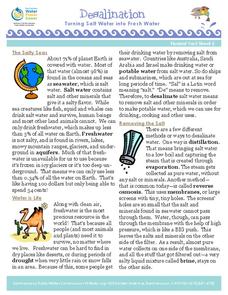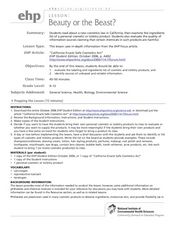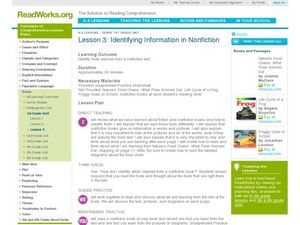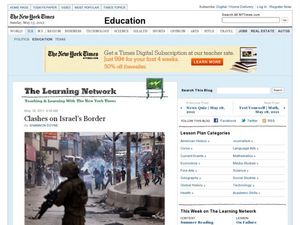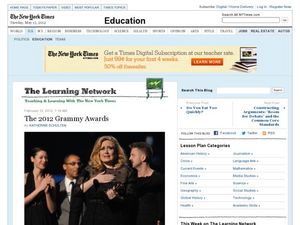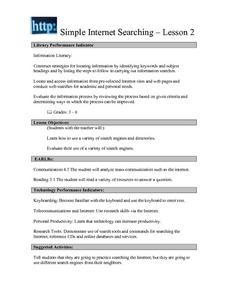San Francisco Public Utilities Commission
Desalination: Turning Salt Water into Fresh Water
How does San Francisco supply its citizens with enough water, even during a drought? Learn about reservoirs and why desalination could be a good solution with a reading passage about water conservation. After kids finish the...
Curated OER
Compare and Contrast Cultures
Using informational text to make cross cultural comparisons is a great way to build a global understanding and comparative analysis skills. With several handy worksheets and a Venn diagram the class will read to make cross textual...
EngageNY
Taking Notes and Citing Quotes from Text: Gathering Information on our Rainforest Insects
In other words. Scholars practice using paraphrasing and quotes. They partner in pairs to write a paraphrase for an information text strip. Individuals then use their skills to paraphrase information from the text Fire Ants.
Curated OER
Beauty or the Beast
Does the FDA really intend to protect public health? Spark a debate in your chemistry or health class by using this article, titled "Beauty or the Beast." It questions the safety of cosmetics and toiletry products, govenment regulations,...
Curated OER
Identifying Information in Nonfiction
Second graders investigate information in non-fiction texts. They review the features of a non-fiction text and read the book Nature's Food Chains: What Polar Animals Eat. Pupils discuss the text features and write down one fact they...
Curated OER
English Lesson Plans for Grade 8
Demonstrate how to engage in a polite and professional conversation with this banking and interfacing lesson. Focusing on explanatory and informaitonal texts, middle schoolers write sentences using banking and finance terminologies....
Ontario
Reading Graphic Text
Do students really need to be taught how to read cartoons, comic books, and comic strips? Yes. Just as they need to learn how to read other forms of graphic text such as diagrams, photos, timetables, maps, charts, and tables. Young...
Curated OER
Hopeful Eyes on Southern Skies
The Times covered a drought in 2011, which affected producers, consumers, and sellers. The class gets informed about climate and the economics of agriculture as the read this article and answer each of the 11 comprehension questions. A...
Curated OER
Taboo Table Talk
Create memories for your family that are enjoyable, as well as helping to enhance their ability to read and understand information.
ReadWriteThink
What is Poetry? Contrasting Poetry and Prose
Introduce middle schoolers to the different strategies used when reading prose versus poetry. Groups use a Venn diagram and a poetry analysis handout to compare the characteristics of an informational text and a poem on the same subject...
Curated OER
Clashes on Israel's Border
Here are 11 questions intended to guide learners as they read a New York Times article about the violence and conflict between Israel and Palestine. They can review the questions and then read the article to help answer them. A link to a...
Curated OER
Earthquake Strikes Virginia
In August of 2011 an earthquake shook the nation's capitol, and became a newsworthy event; learners read this New York Times article to find out why. They read the piece then answer nine related comprehension questions. Two additional...
Curated OER
Where the Books Are
The news is full of interesting stories and ideas shared in an informational style. Readers use the provided who, what, when, where, and why questions as they explore an article about a man who is passionate about archiving physical...
Curated OER
New Rules for Sunscreens
What are UVB and UVB rays, and why isn't my sunscreen good enough? Kids find out all the newest information regarding sunscreen and skin cancer as they read this New York Times article. They read the article then answer eight related...
Curated OER
The 2012 Grammy Awards
Kids answer 11 who, what, when, where, and why questions after reading a New York Times article about the Grammy Awards. Boosting reading comprehension by reading about a topical event keeps pupils informed and interested. A related blog...
Curated OER
The Value of Facebook
Does Facebook actually have any value? Find out what the New York Times thinks by reading this informational article. Learners use the 10 guiding questions to aid them as the read the provided article regarding the value of Facebook. Two...
Curated OER
Reading about Recent Exhibits in the Art and Design Section
A large part of analyzing or understanding art is knowing how to read about it. The New York Times has put together these who, what, where, when, and how questions to aid learners in comprehending informational pieces related to art and...
Curated OER
Reacting to the Rapture
FamilyRadio.com publicized that the Rapture or Judgement Day would happen on May 21, 2011, it didn't. Informed students read a New York Times article on the topic, then answer nine related comprehension questions.
PBS
Facts vs. Opinions vs. Informed Opinions and their Role in Journalism
Do reporters write about what they see, or what they think? Examine the differences between investigative writing and opinion writing with a lesson from PBS. Learners look over different examples of each kind of reporting, and convince...
Computer Science Unplugged
Twenty Guesses—Information Theory
How do we determine how much information to include and what can be left out? By playing a game of 20 questions, the class generates the best strategies for finding a number. They then move on to guessing the next letter in a short...
John F. Kennedy Center
Harriet Tubman: An Informative and Impressionistic Look
Informational text and impressionistic art lead a lesson about Harriet Tubman. Working in teams, scholars examine a variety of resources. They analyze, compare, and contrast the work. Using their research findings, pupils create an...
Curated OER
Simple Internet Searching Lesson 2
Learn how to use search engines and keywords! Learners evaluate the information process using given criteria and determine ways in which the process may be improved.
EngageNY
Mid-Unit 2 Assessment: Inferring About the Silversmith Trade in Colonial Times
The seventh lesson plan in this unit on colonial trade assesses fourth graders' ability to use details from an informational text to make inferences and create a piece of informative writing. The included assessment begins with learners...
Curated OER
Medical Explorer: The Big Idea
Read informational text which relays how medical care differs around the globe and throughout history. There are three separate lessons, each focused on a particular case study, regional medical availability, and cultural norms. Learners...


